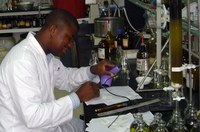 The annual award, sponsored by TWAS Fellow Atta-ur-Rahman, will be given to a young chemist in a scientifically lagging country. The first recipient of the award will be announced at the 23rd General Meeting of TWAS scheduled to take place in Tianjin next year.
The annual award, sponsored by TWAS Fellow Atta-ur-Rahman, will be given to a young chemist in a scientifically lagging country. The first recipient of the award will be announced at the 23rd General Meeting of TWAS scheduled to take place in Tianjin next year.
"The intention of the prize is to encourage young researchers in scientifically lagging countries to pursue careers in cutting-edge fields of chemistry," says Atta-ur-Rahman.
"The kind of research currently taking place in many developing countries," he states, "largely focuses on traditional fields of chemistry – for example, the study of simple chemical structures and compounds."
"Cutting-edge chemistry," he is quick to add, "now encompasses a much wider range of subject areas."
In fact, some of the most exciting areas of science today lie at the interface of chemistry and biology. Atta-ur-Rahman points to the emerging fields of cell signalling, neuroscience, bioinformatics and structural biology as examples. Chemistry, he observes, also plays a prominent role in nanotechnology and molecular medicine.
"The prize," Atta-ur-Rahman says, "is just one modest response to a larger challenge." Improving the state of chemistry will require a wide range of measures – for example, curriculum reform that recognizes and encourages young people to pursue research in these new fields, access to sophisticated equipment that is needed to conduct this research, a larger pool of research grants for undergraduate, graduate and postgraduate studies, and ample job opportunities for those students who choose chemistry as their career.
Organizations such as TWAS, the Organization of Islamic Cooperation's (OIC) Standing Committee on Scientific and Technical Cooperation (COMSTECH) in Pakistan, the International Foundation for Science (ISF) in Sweden and the World Health Organization (WHO) are helping to promote the field of chemistry, especially in their efforts to provide research grants.
But Atta-ur-Rahman says that much more needs to be done to ensure that young people in scientifically lagging countries have the opportunity to pursue careers in chemistry if that is where their interests and passions lie."
"The challenge is large," he admits. "But we now have an increasing number of developing countries and emerging economies that are showing the way."
"I am hopeful that excellence in chemistry research will grow in the years ahead and that a rising number of developing countries will recognize the critical role that chemistry plays in their economic and social well-being."

